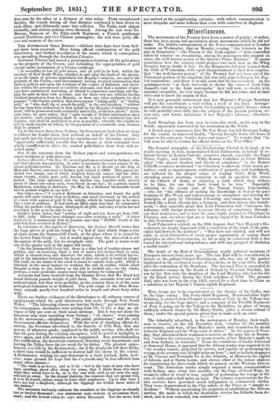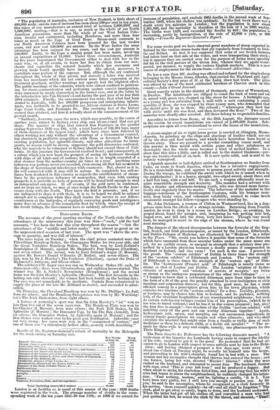Alioultauton
The movements of the Premier have been a source of gossip; or rather, there has been gossip and speculation about movements which he did not make. The Dublin correspondent of the Times communicated to London readers on Wednesday, that on Monday evening "the loiterers on the pier at Kingstown "—the Pincus of the Irish capital—" were somewhat taken by surprise on recognizing, among the passengers who stopped on shore, the well-known person of the Queen's Prime Minister." It seems miraculous how the country could produce two such men as the Whig Premier, but no doubt it has ; for the Kingstown loiterers learned from the Globe of Wednesday, with equal disappointment to their first surprise, that "the well-known person" of the Premier had not been out of the Protestant portion of the kingdom, but was only gone to Bangor, for Eng- lish rustication; and there it would seem that he has remained. As the quidnuncs were "at their wit's-end to divine the cause of Lord. John Russell's visit to the Irish metropolis," they will now, no doubt, with national versatility, be very angry because he did not come, and at their wit's-end to know the reason of that.
It is now generally understood that her Majesty's Foreign Secretary will pay his constituents a visit within a week or ten days. Arrange- ments are already making to invite his Lordship to a public dinner; when he will probably enter fully into the subject of the present position, re- cent acts, and future intentions of her Majesty's advisers.—Sherborite Journal.
Lord Brougham has been seen in town this week, on his way to the South ; apparently renovated by his rustication in the North.
A Scotch paper announces that Mr. Fox Manic has left Drumour Lodge for the season, in improved health, "having brought down 425 brace of grouse to his own gun, besides hares and snipes." No wonder that "he will soon be able to resume his official duties at the War Office."
The General Asssembly of the Presbyterian Church in Ireland, at its yearly meeting in July, memorialized Lord Palmerston on behalf of re- ligious liberty in Roman Catholic countries abroad, especially the Papal States, Naples, and Austria. While Roman Catholics in Great Britain enjoy "the utmost freedom and liberty of conscience," in the Roman Catholic countries mentioned "no toleration is allowed, while heavy pe- nalties—such as imprisonment, confiscation of property, and banishment, are inflicted for the alleged crime of reading God's Holy Word, attending prayer meetings, venturing to call in question the errors of the Church of Rome, or abjuring a faith which the believe to be false, for one they have found to be true." Jsapecsaliy referring to the recent case of the Tuscan Count, Guieciandini, —who for "the offences of seeking the knowledge of God at the pure fountain of His Word, and endeavouring to strengthen and develop the principles of piety by Christian fellowship and communion, has been treated like a felon, thrown into a dungeon, and then driven into banish- ment,"—they earnestly plead that Lord Palmerston will "interpose his influence with foreign powers to secure liberty of conscience, through- out their dominions, and to have the same rights granted to Christians in Florence and elsewhere that are so largely enjoyed by Roman Catholics in this Protestant empire."
Lord Palmerston replied, on the 20th August, that "her Majesty's Go- vernment are deeply impressed with a conviction of the truth of the prin- ciples laid down in the petition" ; "they have not omitted, and will not omit, to avail themselves of every proper opportunity of urging those principles on other Governments, as far as may be consistent with a dile regard for international independence, and with any prospect of obtetninz a useful result."
The death of the Earl of Donoughmore recalls political incidents of European interest forty years ago. The late Earl will be remembered in history as the gallant Colonel Hutchinson, who was one of the parties implicated in the celebrated escape of Lavalette, in the year 1815, shortly after the restoration of the Bourbons. The deceased Peer is succeeded in his extensive estates in the South of Ireland by Viscount Suirdale, his son by his first wife, the daughter of the Lord Montjoy who lust his life in the Royal service during the Irish rebellion of 1798. The present Earl, who was born in the year 1823, served foe a short time in China as a subaltern in her Majesty's Ninety-eighth Regiment More troops are to be concentrated on the theatre of the Caffre war in the Cape colony. The Forty-third Regiment, Monmouthshire Light Infantry, is ordered from Clonmel to embark at Cork in the Vulcan war steam-ship, for the Cape direct ; and a company of the Twelfth Regiment of Foot is going out by the Vulcan to the Mauritius, in place of troops suddenly ordered thence by, Sir Harry Smith, (after a recent refusal of them,) under the special powers given him to make such an order.
The Admiralty advertised, in the newspapers of Monday, their readi- ness to receive, on the 4th December next, "tenders for the monthly conveyance, each way, of her Majesty's mails and despatches by steam between England and the West coast of Africa." In the papers of Tues- day, they advertised their readiness to receive, on the same day in Decem- ber, "tenders for conveyance, by steam-vessels, of her Majesty's mails to and from Sydney, in Australia." From the conditions of tender delivered at Somerset House, it appeared that the African tender was required to be "for wooden vessels, propelled by screws, and capable of performing the voyage at the average rate of eight miles an hour " ; and to include stoppages at St. Vincent and Fernando Po in the Atlantic, at Monrovia the capital of Liberia, and at Sierra Leone, and eleven other of the minor stations for suppressing the slave-trade -which we possess on the Western African coast. The Australian tender simply required a steam communication with Sydney once every two months, via the Cape of Good Hope, by steamers either of wood or iron, capable of performing the voyage at the rate of eight-and-a-half miles an hour. The relative requirements for the two services have provoked much indignation in commercial circle!. They were characterized in the City article of the Times as simply n- diculons." Without questioning the propriety of establishing the African service, the mode in which. the Australian service has hitherto been.de- sired, and is now conceded, was contrasted- "The population of Australia, exclusive of New Zealand, is little, short, ofi 400,000 sous; audits rate of increase has been about 100per cent in tea peers..
She takes of our manufactures an annual total of between 2,000,0001.. and : 3,000,0001 sterling,—that is to say, as much as the whole of our North` American possessions, more than the whole of our West Indian Colo- nies, insular and continental, including Honduras, and more than four times as much as the Cape of Good Hope. Steam-mail contracts to our North American Colonies have been granted for the last twelve years, and now cost 169,0001. per annum. By the West Indies the same advantage has been enjoyed for ten years, and the cost per annum is 240 0004 Lastly, to the Cape a similar, grant has been made, involving an annual expenditure of 31,0001. Under these circumstanoes, Australia for five years importuned the Government either to deal with her in the same way, or, at all events, to leave her free to obtain from our mer- chants and capitalists the natural benefits which her enormous and growing trade would speedily have insured. She offered, moreover, to contribute some portion of the expense. But, although the cry continued throughout the whole of that period, and scarcely a letter was received from her merchants which did not contain some bitter expression at the treatment practised, neither warnings nor appeals had the slightest effect. The public meetings of the colonists, which were almost confined to petition- ing for steam communication and protesting against convict immigration, were answered by steady obstruction in the former case, and in the latter by the introduction into Van Diemen's Land during the past year of no less than 2894 criminals. Finally, the announcement was made, that what had been denied to Australia, with her 400,000 prosperous and enterprising inhabi- tants, was forthwith to be granted to our African stations at Sierra Leone, Cape Coast Castle, and Fernando Po. The crowning fact of the history seemed thus attained, and here it actually stood at the commencement of the present month.
"Suddenly, however, came the news, which may possibly, in the course of another year, attract to Sydney every ship and steam-veasel that can get there. The number of ships that entered San Francisco in the quarter ending September 18.50 was 488, with a total burden of 149,364 tons, many of them steamers of the lar,eest kind; which have since been followed by others working not only without the advantage of a Government contract, but absolutely in profitable competition with those so favoured. With her existing population, her splendid climate, and other attractions for immi- grants, no reason could be shown, supposing the gold discoveries confirmed, why. the marvels to be wituessed at Sydney should not exceed those of Cali- fornia. At this juncture the Government resolved to act; and consequently, to a colony which can now boast the prospect of seeing its harbours thronged with ships of all kinds and all nations, the boon is at length conceded of a slow steamer from the mother-country six times in a year. Anything more ludicrous was perhaps never yet recorded, even among all that has occurred in the shape of Government interference with commerce. But, absurd as it is the evil connected with it may still be serious. So completely has self-re- liance been deadened in this country as regards the establishment of steam- lines by the pernicious influence of monopolies, that even with existing prospects it is probable no body of persons will be found bold enough to start an independent enterprise. At all events, if the gold news be confirmed, and no steps are taken, we v at once resign the South Pacific to the Ame- ricans along with the North. They know the field it presents ; and, if we are indisposed to share it with them, it is to be hoped we shall be rational enough not to complain when they shall render the service to our fellow- countrymen at the Antipodes, of regularly conveying goods and intelligence many days in advance of the remarkable fleet for which, since the receipt of the recent tidings, the Government have so suddenly advertised."



























 Previous page
Previous page